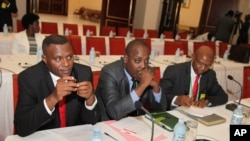On the eve of the African Union summit in the Ethiopian capital, Addis Ababa, Burundi has again said it will not accept AU peacekeepers in the country.
On Thursday, Burundi’s main opposition coalition CNARED urged the African Union and the international community to send an AU peacekeeping force.
CNARED leader Leonard Nyangoma said a failure by the international community to support the Burundian people would lead to the “resurgence of armed groups” to fight what he called “the aggression of [President] Pierre Nkurunziza.”
Burundi had already said any AU peacekeepers in Burundi would be considered an invasion force. Foreign Minister Alain Nyamitwe said the AU cannot send troops to any member country without the approval of that country.
“It is one thing to ask for AU to send troops; it is another thing for the AU to operationalize that request. What we all know is that the AU is not going to send troops to countries that have not expressed their consent of sending the troops. That was the conclusion of the ministerial meeting of the East African Standby Force. Now, if that was the conclusion of the ministerial meeting, I doubt that the AU Peace and Security Council will do otherwise,” he said.
Nyamitwe said Burundi will tell African leaders that Burundi is opened to principled cooperation.
“The matter is not simply saying we want to deploy, but why do you have to deploy in the first place. So we are going to tell the Peace and Security Council how committed to peace and stability we are, what are the steps that we have already undertaken towards peace in Bujumbura,” Nyamitwe said.
He said he will tell the African Union that the government of President Pierre Nkurunziza has never opposed any kind of international presence in Bujumbura and Burundi in general.
Nyamitwe referenced his government’s acceptance of human rights monitors. Now, he said the African Union and the government will need to sit together to work out the modalities of the deployment of additional monitors.
Erastus Mwencha, the African Union deputy chairman of the African Union Commission, told VOA recently that the job of any government is to protect its citizens. But he said the Burundian government has not shown it can protect all its citizens.
Nyamitwe said Burundi enjoys the support of most members of the African Union as evidenced by Burundi election this week to the AU Peace and Security Council for the next two years.
“It is a demonstration that they recognize that in Burundi there is a legitimate government which has participated fully in peacekeeping in Africa and beyond and is delivering in that area. And they have acknowledged that in re-electing Burundi as one of the 15 member states to spearhead the matter of peace and security on the continent,” Nyamitwe said.
Meanwhile, the human rights group Amnesty International said satellite images and witnesses point to possible mass graves in Burundi that appeared after security forces retaliated against rebel gunmen in Bujumbura.
Amnesty's director for East Africa, Muthoni Wanyeki, said Thursday, "These images suggest a deliberate effort by authorities to cover up the extent of the killings by their security forces and to prevent the full truth from coming out."
Amnesty said police and security forces killed dozens of people on December 11 after rebels attacked three military bases in the capital.
Nyamitwe refused to comment on the report.
“I’m not a specialist of satellite imaging. So, I wouldn’t like to comment on this one way or the others, and I am not, unfortunately a technology whiz,” he said.











